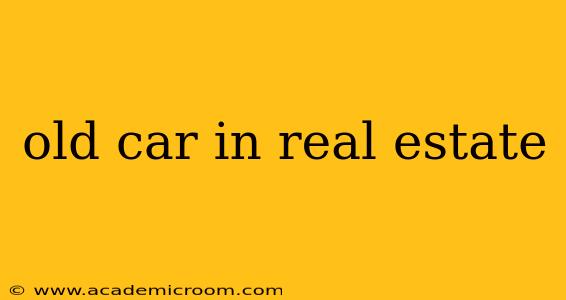The world of real estate often conjures images of gleaming new homes and modern developments. However, there's a surprising connection between the seemingly disparate worlds of real estate and classic cars. While not directly involved in the property transaction itself, old cars can significantly impact a property's value, marketability, and even the overall deal. This article explores the multifaceted relationship between old cars and real estate, answering frequently asked questions about this unique connection.
How Can an Old Car Affect a Property's Value?
The presence of an old car on a property can be a double-edged sword. For some buyers, a classic car, especially one in excellent condition, can add significant curb appeal and enhance the property's overall attractiveness. This is particularly true for buyers who share the seller's interest in vintage automobiles. A well-maintained, rare classic car parked neatly on the driveway can be a compelling selling point, potentially justifying a higher asking price.
On the other hand, a dilapidated, rusting car left to decay on the property can dramatically decrease its value. Buyers will see it as a sign of neglect and potential hidden problems with the property itself. This negative perception can significantly impact the sale price, sometimes leading to protracted negotiations or even a failed sale. It’s important to remember that first impressions matter greatly in real estate.
Does an Old Car Affect the Appraisal of a Property?
Appraisers primarily assess the property itself – the house, land, and any attached structures. However, the condition of the property, including the presence of vehicles, is factored into the overall assessment. A neglected car can negatively influence an appraiser's opinion of the property's maintenance and overall condition, potentially leading to a lower appraisal. Conversely, a meticulously maintained classic car isn't likely to directly increase the appraisal, but its absence of negative impact might contribute to a more favorable overall assessment.
Can an Old Car Be Included in a Real Estate Sale?
Whether an old car is included in the sale depends entirely on the agreement between the buyer and seller. It's essential to clearly state in the contract whether the car is part of the property sale or a separate transaction. This prevents misunderstandings and disputes after the closing. Often, classic cars have significant individual value, warranting separate negotiation and potentially requiring a bill of sale distinct from the real estate closing documents.
What if the Old Car is on the Property But Not Working?
A non-functional old car poses a more significant challenge. It’s seen as junk and significantly detracts from the property’s curb appeal. The seller should remove it before listing the property. If removal is impossible, it's crucial to disclose its presence fully and transparently to potential buyers. Failing to do so could result in legal repercussions later. Removal might be necessary to meet local ordinances related to abandoned vehicles, as some jurisdictions impose fines or penalties for allowing such vehicles to remain on private property.
How Can I Sell an Old Car Separately From My House Sale?
Selling a classic car separately often requires a dedicated approach. Online marketplaces specializing in classic cars are ideal platforms. High-quality photographs and a detailed description emphasizing the car's unique features and condition are crucial for attracting serious buyers. Consider engaging a professional car appraiser to determine its fair market value and ensure a transparent and successful sale.
Conclusion:
The relationship between old cars and real estate is nuanced. While a classic car can enhance a property's appeal, a neglected vehicle can significantly damage its marketability. Transparency, proactive removal of junk cars, and clear communication with buyers and appraisers are crucial for a successful real estate transaction, even when classic cars are involved. Remember that proactive preparation always pays off in the competitive world of real estate.
